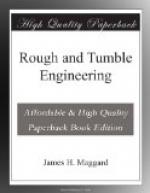SCALE
Advertisements say that certain compounds will prevent scale on boilers, and I think they tell the truth, as far as they go; but they don’t say what the result may be on iron. I will not advise the use of any of these preparations, for several reasons. In the first place, certain chemicals will successfully remove the scale formed by water charged with bicarbonate of lime, and have no effect on water charged with sulphate of lime. Some kinds of bark-summac, logwood, etc.,-are sufficient to remove the scale from water charged with magnesia or carbonate of lime, but they are injurious to the iron owing to the tannic acid with which they are charged. Vinegar, rotten apples, slop, etc., owing to their containing acetic acid, will remove scale, but this is even more injurious to the iron than the barks. Alkalies of any kind, such as soda, will be found good in water containing sulphate of lime, by converting it into a carbonate and thereby forming a soft scale, which is easily washed out; but these have their objections, for, when used to excess, they cause foaming.
Petroleum is not a bad thing in water where sulphate of lime prevails; but you should use only the refined, as crude oil sometimes helps to form a very injurious scale. Carbonate of soda and corn-starch have been recommended as a scale preventative, and I am inclined to think they are as good as anything, but as we are out in the country most of the time I can tell you of a simple little thing that will answer the same purpose, and can usually be had with little trouble. Every Monday morning just dump a hatful of potatoes into your boiler, and Saturday night wash the boiler out, as I have already suggested, and when the fall’s run is over there will not be much scale in the boiler.
CLEAN FLUES.
We have been urging you to keep your boiler clean. Now, to get the best results from your fuel, it will also be necessary to keep your flues clean; as soot and ashes are non-conductors of heat, you will find it very difficult to get up steam with a coating of soot in your tubes. Most factories furnish with each engine a flue cleaner and rod. This cleaner should be made to fit the tubes snug, and should be forced through each separate tube every morning before building a fire. Some engineers never touch their flues with a cleaner, but when they choke the exhaust sufficiently to create such a draught as to clean the flues, they are working the engine at a great disadvantage, besides being much more liable to pull the fire out at the top of smokestack. If it were not necessary to create draught by reducing your exhaust nozzle, your engine would run much nicer and be much more powerful if your nozzle was not reduced at all. However, you must reduce it sufficiently to give draught, but don’t impair the power by making the engine clean its own flues. I




